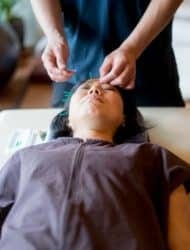Here Are Some of the Best Ways Acupuncture Can Help Your Brain
If you’ve ever had an acupuncture treatment, you may have experienced its calming effects – or perhaps some pain relief, or maybe it helped strengthen your immune system to better fight off a cold or flu.
Indeed, this roughly 3,000-year-old form of healing offers these health benefits and many more – including brain health. Research is showing that a little needling is good for your mind!
But before diving into the brain health benefits of acupuncture, it’s important to understand some basics.
About Acupuncture
For many people, the idea of an acupuncturist poking you with needles to improve health may seem truly bizarre. That’s understandable. Acupuncture was born out of a different system of medicine called Traditional Chinese Medicine (TCM).
Yet, in recent decades, Western medicine has studied and embraced acupuncture. In fact, it’s so well accepted that many top U.S. medical schools now have acupuncture programs, including UCLA, Harvard, Yale, Stanford, and Johns Hopkins – to name a few.
How Does It Work?

Through the prism of Western medicine, acupuncture points stimulate the central nervous system, which then releases a number of chemicals into your body’s muscles, spinal cord, and brain. It’s believed that these biochemical happenings are what stimulates the body’s natural healing response, promoting physical and emotional well-being.
This stimulation typically involves penetrating the skin with hair-thin, sterile, one-time-use needles that are manipulated by the acupuncturist. While one might feel a sensation, most individuals experience little or no pain from the needles.
The National Institutes of Health suggests that acupuncture might be a good option for those who struggle with persistent pain. Several studies show acupuncture may ease types of pain such as persistent pain in the lower back, neck, and joints. Research also suggests that acupuncture may be helpful for many other health issues such as dental pain, autoimmune issues/pain, wrist pain, cravings/addictive behavior, feelings of nausea, and cramping during menstruation.
Below, you’ll discover how acupuncture can help support your brain function.
6 of the Best Ways Acupuncture Can Help Your Brain
- Increased Cerebral Blood Flow
A 2016 study examined acupuncture for rehabilitation of stroke victims. A number of post-stroke patients showed a marked influence on cerebral blood flow velocity to the brain following acupuncture. Increased blood flow to the brain is good for more than just recovering from a stroke – it also helps your brain function better.
Although the brain makes up only 2% of your body’s weight, it uses 20% of the oxygen and blood flow in your body. With an ample blood supply bringing oxygen and nutrients to the brain, and taking away carbon dioxide and other waste, everything works better. That means better memory recall, focus, concentration, mood, and general cognition.
- Fewer Migraines
There have been several scientific studies conducted on acupuncture for migraines. One review study suggested that a course of acupuncture (at least 6 sessions) offers a legitimate option for relief for people suffering from migraines as it appears to reduce the frequency of headaches. What’s more, trials also suggest that acupuncture may be as effective as pain-relieving medication!
- Reduces Stress, Improves Mood
Studies have shown lower cortisol levels after acupuncture, which suggests that the body’s autonomic nervous system has switched off the stress response and turned on the “rest and digest” parasympathetic nervous system. This calm state increases brain connectivity and can help with attention, learning, and recall.
Acupuncture also may help to release mood-lifting hormones and natural chemicals such as GABA, serotonin, dopamine, and endorphins. With its stress-reducing effects, acupuncture can help reduce feelings of anxiousness.
- Increases Neuroplasticity
Some research has suggested that certain acupuncture points have connections to various regions of the brain, and can help to encourage neurogenesis, strengthening of synapse connections and turnover, and dendritic repair.
It’s believed that these effects may help protect against neurodegenerative issues. This kind of action is also important to memory and skill learning.
- Sleep
Restful sleep is essential to a strong immune system and an optimally functioning brain. Cognition and memory may suffer with lack of sleep.
While more research is needed, acupuncture’s relaxing effects appear to help sleep. In fact, it’s been shown to be effective for people who struggle with sleeplessness. Some research also indicates that acupuncture may be particularly helpful for people who suffer with low mood related to sleeplessness.
- Brain Fog
Neuroinflammation can cause brain fog, which makes acupuncture for the brain compelling. In 2021, Harvard researchers examined how specific acupuncture points with added brief electrical stimulation led to significant reductions in inflammatory markers in animal subjects. Acupuncture appears to help clear the fog.
Last Points
The research backing acupuncture’s efficacy makes it a viable option for several health issues, and certainly for supporting a healthy brain.
If you want to try it for yourself, it’s recommended that you discuss acupuncture with your medical doctor first, and seek out a reputable, licensed acupuncturist. Ask for a referral from your doctor or a trusted family member or friend.
Remember, acupuncture takes time. Be sure you can commit to a full course of treatment before going and check with your insurance company to see if it’s covered.
Don’t let the needles scare you; acupuncture can be a wonderful way to support your brain and body health.
At BrainMD, we’re dedicated to providing the highest purity nutrients to improve your physical health and overall well-being. For more information about our full list of brain healthy supplements, please visit us at BrainMD.
- Here Are Some of the Best Tension Release Exercises to Help You Feel Your Best! - April 17, 2024
- Foodscaping: How to Grow Healthy Foods In Your Own Garden! - April 12, 2024
- Eat Your Fruits and Veggies (Don’t Drink Them) - March 29, 2024



